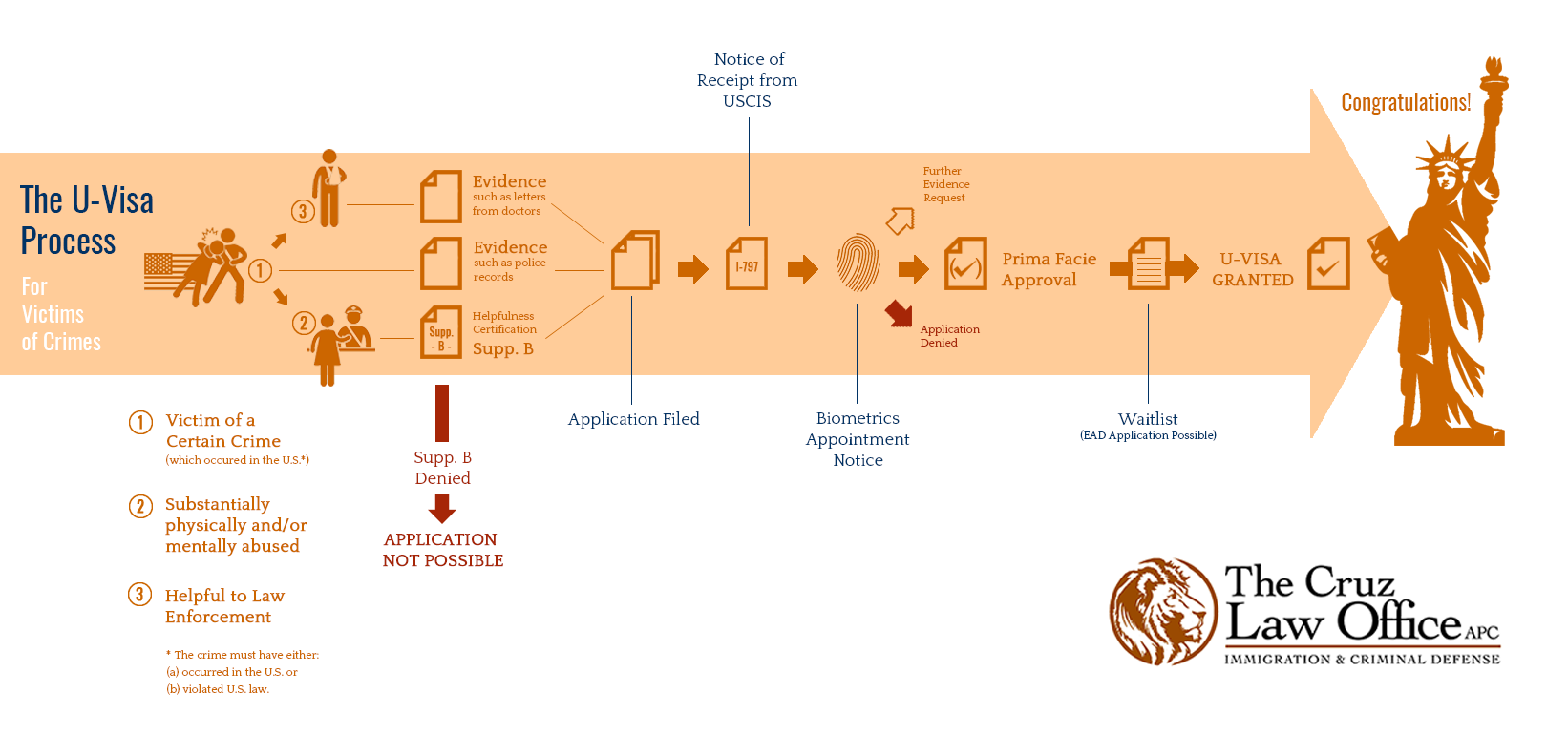The Way to a U Visa – How Can I Apply for a U Visa?

Being the victim of a crime is devastating and nothing should stand in your way to help law enforcement to bring the person responsible to justice. For this reason, Congress enacted legislation to help immigrants who were the victims of certain qualifying crimes. A U visa allows immigrant victims of crimes to legally live and work in the U.S. for up to four years. Furthermore, after living in the U.S. on a U visa for three years, it is possible to apply for a green card.
The following information will help you to understand the U visa application process for victims of a crime. If you want to know more about U visa applications, call Mr. Cruz today at (619) 717-2233 for a free consultation.
Process
- What evidence and which supporting documents do I need to apply for a U visa?
- How can I get a police report in San Diego county?
- What are the filing fees for a U visa application?
- Who can I include as derivatives in my application for a U-Visa?
- How long will it take for me to get a U visa?
- Why does it take so long to get a U visa?
- Can I expedite my U-Visa application so that I can have a faster decision?
- Can I work in the U.S. while my U visa application is being processed?
- Can I apply for a green card after my U visa is approved?
APPLICATION | What evidence and which supporting documents do I need to apply for a U visa?
To convince USCIS that you are deserving of a U visa, you have to submit any and all documents that explain and support your claim. Below you will find a list of documents you need to submit (mandatory) and a list of documents that are not necessary, but can be important evidence to support your claims (optional).
Be aware that if any of the documents are in a language other than English you have to submit both the original copy of the foreign language document and an English translation.
1. Mandatory documents:
Cover letter
Letter addressed to USCIS from you or your lawyer, which briefly states:
- Your personal information (full name, date of birth, alien number, country of origin)
- Key facts of your application (crime, date, place, reason why inadmissibility waiver is filed if applicable)
- A list of all enclosed documents (forms and supporting documentation)
Form I-918
Main application form for you, the principal applicant, on which you answer questions about:
- Your personal information (full name, date of birth, address, etc.)
- “Additional information” relevant to you application (whether you have been the victim of a crime, whether you were helpful, etc.)
- “Processing information” about your former activities which may be reasons for inadmissibility
- Personal information about your spouse and/or children (full name, date of birth, etc.)
- Signature etc.
Form I-918 Supplement A (if applicable)
Application form for your family members, the derivative applicants, which is similar to Form I-918
Form I-918 Supplement B (also known as Supp-B)
Form that certifies your helpfulness to law enforcement, on which the certifying law enforcement official answers questions about:
- Personal information about you, the victim (full name, date of birth, etc.)
- Information about the certifying agency
- Information about the crime (category, time, place, description of crime and harm, etc.)
- Information about your helpfulness (explanations, etc.)
- Information about family members involved in the crime
- The official’s certifying signature
Personal statement
Declaration in which you explain why you deserve a U visa (and an inadmissibility waiver, if applicable). Your declaration may include the following information
About you
- Your full name
- Your date and place of birth
- When, how, and why you came to the U.S.
About the crime
- Which crime you were a victim of
- Who was responsible for the crime
- When, where, how, and how often the crime happened
- If anybody saw the crime happening
About the harm you suffered
- How you were hurt (physically and/or mentally)
- How badly and how long you were hurt
- The help you got (and if you did not get help, why not)
- Which doctor or therapist you had to see
- Witnesses to the crime and their name and relationship to you
- Which medicine you had to take
- If you the crime made a condition, which you already had, worse
- If you recovered or are permanently hurt
About your helpfulness
- If you called the police (and if you did not call the police, why not)
- What information you gave the police, the prosecutor, the judge, or other agencies (statement, information about the person responsible, testimony etc.)
- If the person responsible was identified, charged with a crime, arrested, tried, and convicted
About the inadmissibility waiver
- Why you need the waiver
- If and why you broke the law (e.g. drug abuse to cope with domestic violence)
- If you were in jail or probation
- If you regret doing it and/or changed your life since then to avoid breaking the law in the future
- If you have family in the U.S. and how they would be affected if you had to leave
Identity documents
Copies of documents that prove your identity such as passport and birth certificate
2. Mandatory documents for inadmissibility waiver:
Form I-192
Application form for inadmissibility waiver on which you answer questions about:
- Your personal information (full name, date of birth, address, etc.)
- Your immigration and criminal history
- Your biographic information (ethnicity, race, etc.)
- Required signatures (translator and preparer if applicable)
Form I-912
Fee waiver request form (for the inadmissibility waiver) on which you answer questions about:
- Your personal information (full name, date of birth, address, etc.)
- Information about the basis of your request (receiving benefit, low income, or financial hardship)
- Required signatures (family members, translator, and preparer if applicable)
3. Optional documents:
- Police and court records
- Letters from friends & family
- Letters from witnesses
- Letters from doctors & mental health professionals
- Other evidence such as tax filings, employment, etc.
APPLICATION | How can I get a police report in San Diego county?
To document the crime, it is helpful to provide USCIS with the police report. Below you will find instructions on how to obtain a police report in person or via mail from the police departments in San Diego, El Cajon, and Oceanside:
San Diego Police Department
| Where? | When? | What to bring/mail? | |
| In person | SDPD Records Public Counter 1401 Broadway San Diego, CA 92101 |
Monday – Friday 7:30 a.m. – 4 p.m. |
|
| By mail | SDPD Records MS#726, P.O. Box 121431 San Diego, CA 92112-1431 |
|
|
| More information: https://www.sandiego.gov/police/services/faqs/information#report | |||
Oceanside Police Department
| Where? | When? | What to bring/mail? | |
| In person | Oceanside PD Records counter 3855 Mission Ave Oceanside, CA 92058 |
Monday – Friday 8 a.m. – 5 p.m. |
|
| By mail | Oceanside Police Department Attention: Records 3855 Mission Ave. Oceanside, CA 92058 |
|
|
| More information: http://www.ci.oceanside.ca.us/gov/police/admin/records.asp | |||
El Cajon Police Department
| Where? | When? | What to bring/mail? | |
| In person | El Cajon PD 100 Civic Center Way El Cajon, CA 92020 |
Monday – Thursday
+ every other Friday 8 a.m. to 5 p.m. |
|
| By mail | El Cajon Police Department Attention: Records Division (Report Request) 100 Civic Center Way El Cajon, CA 92020 |
|
|
More information: http://www.cityofelcajon.us/your-government/departments/police/information-you-may-need/obtaining-police-reports |
|||
APPLICATION | What are the filing fees for a U visa application?
There is no fee for a U visa application.
If you need to also apply for an inadmissibility waiver, however, you have to either pay the inadmissibility waiver fee (currently $585) or file a fee waiver request. The fee for the inadmissibility waiver may be waived for applicants with limited financial means. On the fee waiver request you will, therefore, have to state why you cannot pay the fee and prove that you receive a public benefit, have a low income, or face a financial hardship (see above for more detailed information under “Admissibility”).
APPLICATION | Who can I include as derivatives in my application for a U-Visa?
As the victim of the crime, you are the principal applicant (U-1) for the U visa. However, certain family members can be included as derivatives in your application and receive the U non-immigration status if your application is approved. The following family members can be included in your U visa application (Form I-918 Supplement A must be filed with the application):
If you, the principal applicant (U-1), are over the age of 21:
- your spouse (U-2)
- your unmarried children under the age of 21 (U-3)
If you, the principal applicant (U-1), are under the age of 21:
- your spouse (U-2)
- your unmarried children under the age of 21 (U-3)
- your parents (U-4)
- your unmarried siblings under the age of 18 (U-5)
All your derivative family members in your U visa application have to be admissible to the U.S. If there are reasons why they may be inadmissible, they have to apply for an inadmissibility waiver as well.
For the purposes of your U visa application, USCIS will consider your age and your family members’ age at the time of filing your application.This means your derivatives will not qualify even if you or one of your family members celebrate another birthday while your U visa application is still being processed.
Processing | How long will it take for me to get a U visa?
Realistically, you can expect the USCIS processing time to be around 14 – 24 months (for the most current information see: https://egov.uscis.gov/cris/processTimesDisplayInit.do >> Service Center: VSC – Vermont Service Center).
Deferred Action under U visa
However, after USCIS decides that you are eligible for a U visa, you are assigned a place on the waitlist for U visas. If your U visa application is approved but there are no U visas available for the fiscal year, you will be given deferral status. You may be able to apply for employment authorization (EAD) during that time. It can take several years after your application is approved before you are issued a U non-immigrant status.
PROCESSING | Why does it take so long to get a U visa?
Unfortunately, processing times for U visas are long. Long wait time exists for several reasons. Firstly, U visa cases are often very complex and there are many documents that need to be reviewed before a decision is made. Secondly, USCIS may request additional evidence regarding your case from you, which often results in a delay. Thirdly, the number of U visas available per fiscal year is capped at 10.000.
Nevertheless, USCIS receives about 25.000 U visa applications each year, which are processed in the order of their arrival. Therefore, even when USCIS decides that an applicant is eligible for a U visa, the applicant will be notified of his or her waitlist status. After the applicant is placed on the waitlist, it may still take several years before a U visa can finally be issued.
Processing | Can I expedite my U visa application so that I can have a faster decision?
Generally, there is no option to expedite the processing time of your U visa application. However, if you are currently in removal proceedings, your lawyer may be able to request the DHS to expedite the processing of your application so that your immigration court case be resolved.
Processing | Can I work in the U.S. while my U visa application is being processed?
Filing a U visa application does not give you the right to work in the U.S. Therefore, while USCIS is processing your application (currently ca. 14 – 24 months) and you are awaiting their decision, you are not allowed to work in the U.S.
When USCIS decides that you are eligible for a U visa, they will notify you of their decision and place you on a waitlist for U visa approval (currently several years). However, because of your eligibility for a U visa, you will be granted “deferred action”, which means that you are a low priority for deportation and you may request a work authorization.
APPROVAL | Can I apply for a green card after my U visa is approved?
Generally, a U visa is granted for a period of four years. However, after a period of three years counting from the date of the U visa approval it is possible to apply for a green card.
To be eligible for an adjustment of status or a green card, you must satisfy the following requirements:
- continuous presence in the U.S. for three years
- no unreasonable refusal to assist in the criminal investigation or prosecution
- admissibility to the U.S.
- proof that your presence in the U.S. is justified on humanitarian grounds, to keep your family together or is in the public interest
Your family members that benefit from your U visa as derivatives may also apply for a green card if they meet the above requirements.
Legal Disclaimer: Nothing in this website should be taken as legal advice for an individual case or situation. The information is intended to be general and should not be relied upon for any specific situation.
If you are still asking, “How Can I Apply for a U Visa?” contact The Cruz Law Office for more information.



